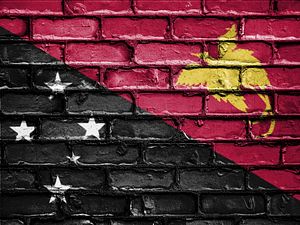Prior to the APEC summit in Port Moresby, Papua New Guinea, last November, officials from Australia, Japan, and the United States signed a Memorandum of Understanding to create a trilateral infrastructure investment partnership for the Indo-Pacific region. The venture would utilize the resources of Australia’s Department of Foreign Affairs and Trade (DFAT) and its Export Finance and Insurance Corporation (Efic), the Japan Bank for International Cooperation (JBIC), and the U.S. Overseas Private Investment Corporation (OPIC) to address the development needs of many of the countries within Asia. The partnership can be viewed as an attempt to counter the increased influence of China and its Belt and Road Initiative (BRI).
In April 2019, the trilateral partners undertook a joint mission to Papua New Guinea (PNG), in order to identify prospective projects. It was reported in the Nikkei Asian Review this week that as a result of this trip the trilateral venture will be funding a new liquefied natural gas (LNG) project in the country, with a projected investment value of $1 billion. Plans are to be finalized over the next two to three years; the location within PNG was not identified.
The impetus for this new partnership seems to have come from Tokyo, and the continuing highly active foreign policy led by Prime Minister Shinzo Abe. Japan has recognized that China’s growing economic weight will afford it the ability to create highly influential investments — via the BRI, for example — which could diminish Japan’s relative regional power. However, Tokyo sees that it may be able to set the agenda for new principles surrounding foreign investment, that could make it (and its partners) a more attractive option for developing states, and potentially even positively influence Beijing’s practices.
An attempt to highlight the concerns about Chinese investment is apparent in the language that Japan has started using to describe its own investments. The terminology Tokyo adopts seem to purposely create a distinction between its initiatives and the reputation of Beijing’s foreign endeavors. In a press release issued this week by JBIC reaffirming its commitment to the trilateral partnership (although not mentioning the LNG project in PNG reported in the Nikkei Asian Review) this was almost comically obvious as it declared the partnership would “….[support] projects that are built to last; are financially sustainable; adhere to high international social, labor and environmental standards; ensure transparency; foster openness and inclusiveness; create economic opportunities for all, including women and local workers; enhance the resilience and self-sufficiency of host countries; and respect national sovereignty.”
While these are laudable aspirations, when investing in a country like PNG these principles will require an added layer of care if they are to be successful in their aims. PNG’s abundance of natural resources, combined with their significant development needs, makes large resource extraction projects like an LNG plant tempting investments. Yet if the implementation of these projects is not handled with sophistication and sensitivity then they have the potential to cause far more harm than good.
Disputes over the Panguna copper mine on the island of Bougainville ignited a decade-long civil war in the 1990s. Ultimately, it may also lead to the region’s secession from PNG in a referendum to be held in October (as interest in the mine continues to cause tensions). And current tensions in the mainland’s Southern Highlands can be linked to the presence of ExxonMobile’s PNG LNG plant. This project also played its part in the recent replacement of the country’s prime minister.
The overarching driver of the trilateral infrastructure investment partnership is the framework of the free and open Indo-Pacific (FOIP) promoted by Japan and the United States, and internalized by Australia. This perspective sees the values and principles embodied by these three states as essential to the enhancement of peace and prosperity in the region. Yet these values and principles shouldn’t be mistaken for culture. Understanding the complexity of local environments is essential for the success of any foreign investment, as a number of major resource extracting companies operating PNG have unfortunately learned by error. While there is a strong recognition that economic development is essential to regional security, attempts at security enhancement need to be keenly aware of their potential to become security threats.
This new trilateral initiative is an obvious reaction to China’s regional ambitions, yet if conducted with local consultation and respect, it should also be a welcome enhanced engagement by these three states. This is an engagement, however, that most likely won’t be accepted with exclusivity. Developing states have the potential to use their agency and play their hands deftly to gain significant benefits from the increased strategic competition between the larger powers. This also needs to be understood and respected by Tokyo, Washington, and Canberra.

































